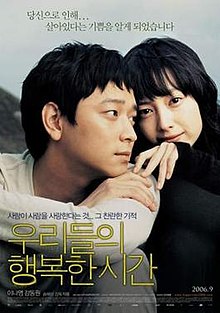Maundy Thursday (film)
| Maundy Thursday | |
|---|---|
 Theatrical poster | |
| Directed by | Song Hae-sung |
| Written by | Jang Min-seok Park Eun-yeong |
| Based on | Our Happy Time by Gong Ji-young |
| Produced by | Lee Seung-jae |
| Starring | Gang Dong-won Lee Na-young |
| Edited by | Park Gok-ji |
| Music by | Lee Jae-jin |
| Distributed by | Prime Entertainment |
Release date |
|
Running time | 120 minutes |
| Country | South Korea |
| Language | Korean |
| Budget | US$4.2 million |
| Box office | US$14,789,716[1] |
Maundy Thursday (Korean: 우리들의 행복한 시간; RR: Urideului haengbokhan shigan; lit. Our Happy Time) is a 2006 South Korean film directed by Song Hae-sung based on a bestselling novel by Gong Ji-young.[2] Starring Gang Dong-won and Lee Na-young,[3] the film is about a convicted murderer awaiting execution, and the bond he forms with a suicidal young woman who starts visiting him in jail every Thursday.
With 3,132,320 admissions, Maundy Thursday was the seventh most popular Korean film of 2006.[4]
Plot[edit]
Yu-jeong (Lee Na-young) has now attempted to commit suicide three times. Her disdain for her mother and indifference to the rest of the world isolates her from any chance for happiness. Yu-jeong's aunt Sister Monica is a nun, and she often goes to the prison to visit death row inmates. Sister Monica meets a new death row inmate who asks if he could meet her niece. Yu-jeong reluctantly agrees.
Yu-jeong and the death row inmate do not open up to each other immediately. Yu-jeong comes from a wealthy family and is a professor at a university. Yet, she has never known happiness since the age of 15 as a result of a sexual assault at the hands of her cousin. The inmate that she meets, named Yun-soo (Gang Dong-won), has had an even more traumatic childhood experience. He was abandoned by his parents at an early age and has had to live on the streets while caring for a younger brother. Eventually Yun-soo ends up involved in the criminal world and gets convicted for murder. With their disparate backgrounds, Yu-jeong and Yun-soo are still able to connect with each other, because both people have encountered grief like few others could possibly know. As they both regain the will to live through their weekly meetings, they must now deal with their feelings for each other and come to grips with the short amount of time they have together.[5][6]
Cast[edit]
- Gang Dong-won as Jung Yun-soo
- Lee Na-young as Moon Yu-jeong
- Youn Yuh-jung as Sister Monica, Yu-jeong's aunt
- Kang Shin-il as Manager Lee
- Jang Hyun-sung as Yu-chan, Yu-jeong's older brother
- Jung Young-sook as Yu-jeong's mother
- Kim Ji-young as Grandmother Park
- Kim Boo-seon as Hong
- Oh Kwang-rok as Death row inmate 2896
- Eun Won-jae as young Yun-soo (teen)
- Lee Byung-jun as young Yun-soo (child)
- Jung In-gi as Jung Min-seok
- Jung Jin as Tae-seong
- Yang Ik-june as Hwan-kyu
- Kim Jin-hyeok as prison guard A
- Kim Se-dong as prison guard Seo
- Lee Jae-gu as Teacher
- Oh Jung-se as Teacher Kim
- Kim So-hee as Yun-soo's mother
- Choi Jung-woo as uncle
- Kim Jae-man as gigolo
- Shin Young-jin as Yu-chan's wife
- Choi Moo-sung as Priest Kim
- Na Ki-soo as priest
- Kim Ja-young as housekeeper
- Choi Yong-min as President Choi
Awards and nominations[edit]
- Best Screenplay – Jang Min-seok, Park Eun-yeong
2006 Blue Dragon Film Awards[7]
- Nomination – Best Actress – Lee Na-young
- Nomination – Best Music – Lee Jae-jin
- Nomination – Best Actor – Gang Dong-won
References[edit]
- ^ "Woo-ri-deul-ui Haeng-bok-han Si-gan (Maundy Thursday)". Box Office Mojo. Retrieved 2007-04-24.
- ^ "Book in brief: An unusual love story". Korea JoongAng Daily. 1 December 2006. Archived from the original on 26 January 2013. Retrieved 2012-12-18.
{{cite web}}: CS1 maint: unfit URL (link) - ^ "Happy Hours and Two Complex Stars". The Chosun Ilbo. 6 September 2009. Retrieved 2012-12-14.
- ^ "The Best Selling Films of 2006 ". Koreanfilm.org. Retrieved 2007-04-24.
- ^ "A Superior Weepie About the Meaning of Compassion". The Chosun Ilbo. 14 September 2006. Retrieved 2013-07-16.
- ^ Park, Soo-mee (7 February 2007). "This film's irony ends with the title". Korea JoongAng Daily. Archived from the original on January 26, 2013. Retrieved 2012-12-18.
{{cite web}}: CS1 maint: unfit URL (link) - ^ "Maundy Thursday - Awards". Cinemasie. Retrieved 2012-12-18.
External links[edit]
- Official website (in Korean)
- Maundy Thursday at IMDb
- Maundy Thursday at the Korean Movie Database
- Maundy Thursday at HanCinema
- Maundy Thursday at AllMovie
